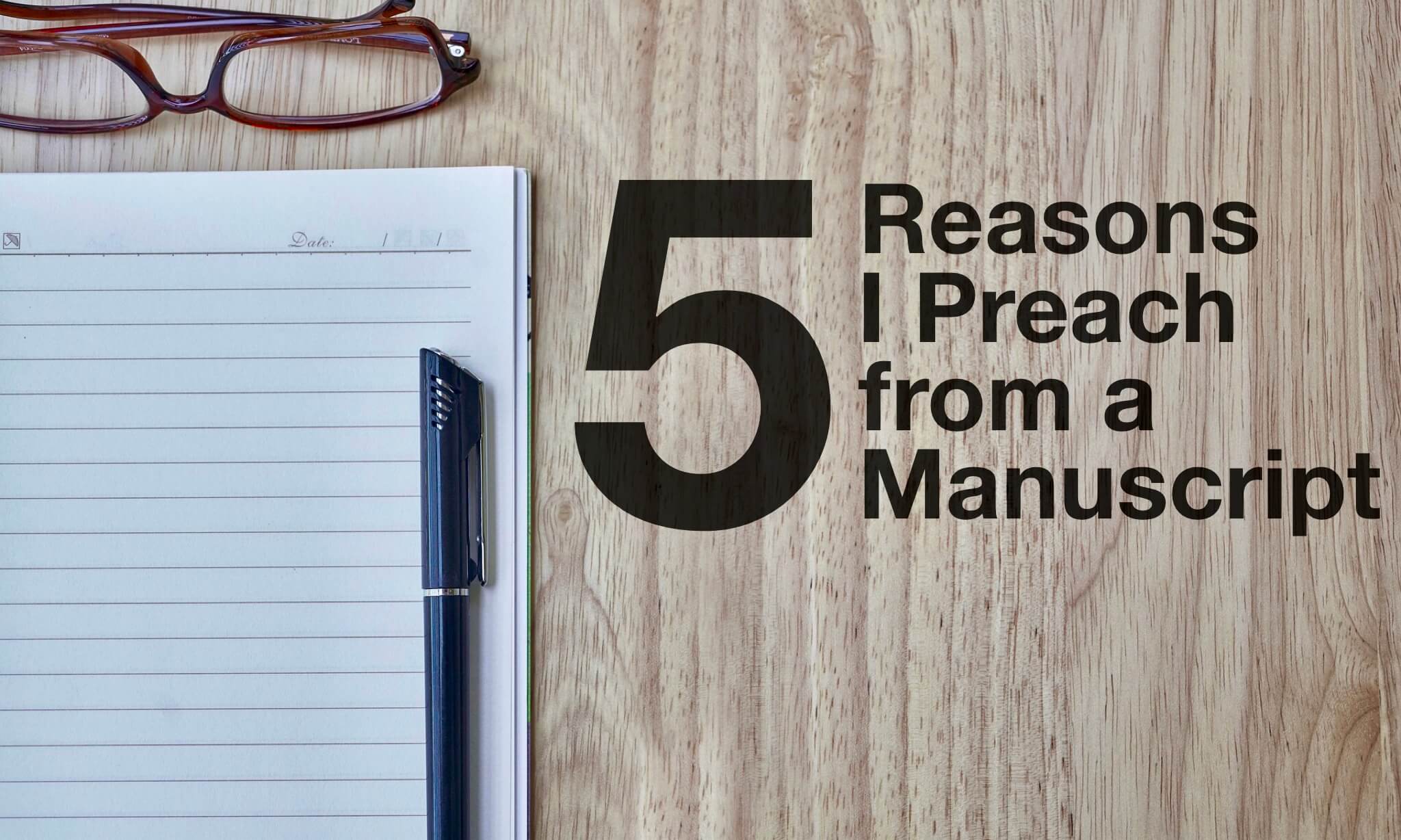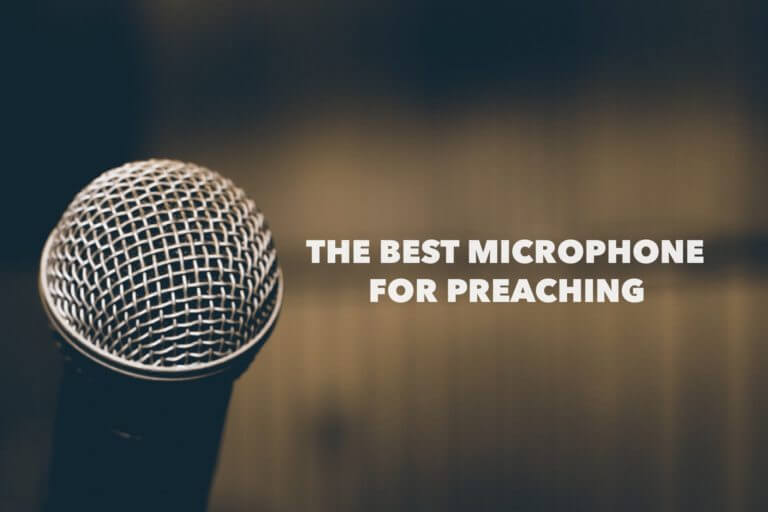5 Reasons I Preach From a Manuscript

Editor’s Note: This is a guest post with an opposite perspective from mine. I believe there’s power in preaching without notes, but there’s no one-size-fits-all style of preaching. I think it’s healthy to engage with both perspectives.
Over a few years of preaching, my preaching style has changed from following a rough outline of notes to reading my manuscript almost verbatim.
Just two years ago, if you asked me to preach from a manuscript, I would have told you that it’s not my style, and I can’t preach like that. Furthermore, it seems like a lesser form of preaching, too much of a crutch for teaching, and a contributing factor to a lack of stage presence.
Not only did I dislike manuscripts for myself, but I also frowned upon the notion of it for any other preacher.
Much to my chagrin, I now preach from a manuscript.
It developed almost by accident. It certainly did not happen purposefully in my mind.
Slowly but surely, I began to expand my outlined sermon notes into more detailed versions. I added more and more and more. Eventually, abbreviated sentences and incomplete grammar began to irritate me. So I wrote out more of my notes like an essay.
Perhaps this came in part because of my saturated study of God’s Word, which I noticed also involves impeccable grammar. I came to realize that the inspired, inerrant Word of God also includes inspired, inerrant grammar.
Therefore, The Word began to change me into a person who not only wanted to become a better person morally, but also one who desired to think, write, and talk a little more grammatically. Therefore, my preaching style began to turn into more of a manuscript style of preaching.
Let me give you a few reasons for why manuscript style preaching might be the best for you as it has become for me.
1. Preaching from a manuscript practices humility
When you preach from a manuscript, you basically admit that your ability to teach is mortal, not immortal.
You confess that your spiritual teaching ability comes with it’s natural limitations, which is yourself. Thus you conclude that you need help, lots of help!
Part of my frustration with following a rough sense of notes was that I sometimes would lose my train of thought, or fail at making good transition statements.
After preaching, I would often feel like I could have explained God much better if I had another chance. I felt like my spoken words fell short of God (of course, they always do!). But I also believed that I was capable of better communication. I believed that God had given me more potential than I was using. At other times, I failed to say what I wanted to say because I forgot to say it!
Preaching from a manuscript helped alleviate all of these problems for me.
Once I could get past myself, I could move onto the sermon manuscript.
In previous years, I believe that I didn’t preach from a sermon manuscript because of pride. I believed that I was too good for that. I wanted to think that I was smart enough to preach more from memory. I wanted to act like I was a really gifted speaker. And I thought that I was!
However, over time and experience, I began to realize that I am just not the kind of pastor/preacher who can most effectively preach from simple notes. Of course, I can do it, as I did, but I won’t release as much of my potential gift unless I use a manuscript.
Maybe you are the kind of person who doesn’t use a manuscript. If you can get past the idea that sermon manuscripts are a lesser form of preaching, then at least consider the possibility that it might help you preach better.
Then again, you may do much better without a sermon manuscript. Perhaps you can’t follow your own words. Maybe you are smarter than me and can remember more than I.
Maybe you can only preach with passion when you are preaching off the top of your head, or maybe you move around too much to be able to follow specific notes. That’s fine because following a sermon manuscript is certainly not superior to any other form of teaching, but it’s also not any less.
2. I preach from a sermon manuscript only for preaching, not teaching
This isn’t really a reason for why I preach from a manuscript so much as it is an explanation of why you might become more prone to try it. You see, I don’t limit myself to a sermon manuscript, as I used to think it would do to me.
I only use the sermon manuscript for Sunday morning preaching, but not Wednesday afternoon Bible study, or Wednesday night prayer meeting, and especially not one to one teaching.
I’m not limited to teaching from a manuscript. I use it as a style of teaching that fits certain occasions to teach.
There is a difference between preaching and teaching. I’ve heard it said that preaching is more of a monologue whereas teaching is more of a dialogue. I also think that preaching is a bit more formal whereas teaching happens more candidly.
When I first thought of the idea of teaching from a manuscript, I disliked it because it would seem to cut off my teaching ability. I reasoned, ‘anybody can read from a paper, right? It doesn’t require a spiritual gift to be able to read a paper.’ That was my narrow view.
But now, as I’ve adopted the preaching style that relies on a manuscript, I now know that it doesn’t restrict my teaching ability; it broadens it. I’m not held hostage by the manuscript (I wrote it!).
I still enjoy teaching freely, candidly, one on one, or in a small group of people. Most of the time, I exercise my ability to teach through the notes of God written on my heart and etched in my memory. Certainly, I am not being pulled by the manuscript. It is being pulled by me.
I’ll use it when my sermon needs to fit within a strict time, or when I have a large group of people in front of me. But I certainly won’t use it if I’m teaching a classroom of students, having one on one time, or teaching a group of youth.
Therefore, it is utterly important to realize that the sermon manuscript is not restrictive, but freeing. If you try it, it won’t take away your ability to teach candidly, because you will continue to teach that way too.
In other words, the people who preach from manuscripts, like myself, probably only use that strict style of speaking on rare occasion. More than likely, they are using their spiritual gift of teaching in other ways that go without notes through the rest of the week.
Thus, learning how to preach from a sermon manuscript will only broaden your ability to speak, as opposed to restrict it. It can strengthen the different times that you do speak without notes, and it will add to your different ways that you can teach.
3. I’m a better writer than I am a speaker
I don’t think incredibly fast, which means that when I speak, I don’t always formulate sentences like I should, or make connections between this thought and that thought like I should.
But when I write, I have all of the time in the world to think about what I want to say and say it well.
I can edit my work by deleting, adding, and changing my paragraphs. This, I can’t do when I speak. Speaking is merciless because what you say is already said, and can’t be undone or unheard, which is not the case with writing.
So as I began journaling and writing more, I realized just how much I enjoy it! Plus, I began to receive more and more affirmation from the other people who read it.
So I began to write out my sermons because of my love for writing. As a result, I began reading more of my writing, which turned into a manuscript form of a sermon.
I also had a six month period of time where I developed and recorded 30-minute messages for a radio station. As I tried to teach and preach to my unseen audience and fit it into 30 quick minutes, I realized that eye contact was not important, but time management was. Therefore, I began writing out my messages and recording them verbatim.
As I played them back to myself, I realized that they sounded good, maybe even better than my other messages. My message was more clear, my words stuttered less, and my overall flow of the message sounded better. My thoughts were also more comprehensive and holistic, all because I could read my message.
In those six months, God gave me the practice that I needed to learn how to preach a message from a manuscript in a way that kept my passion, unhindered my teaching, and used my writing ability.
Perhaps you are a better speaker that you are a writer. Then don’t use the sermon manuscript! But maybe you are a better writer than you are a speaker. Then maybe your teaching ability will increase as you develop a manuscript.
No doubt, it will take practice to preach from your writing without letting your writing hinder your stage presence and eye contact. Nevertheless, I believe that people come to listen to the preacher’s words, more than watch the preacher’s body.
4. God’s Words are more powerful than your presence
Preaching from a manuscript admits that God’s Words are more powerful than your presence.
I believe that God’s Word changes people, rather than my body movements or eye contact.
If I could choose between being a vivacious arm gesturing, leg moving preacher versus a hearty truth sculpting, word engineering preacher, I would choose the second option. And if I could choose both, I would take both!
There is nothing wrong with being flamboyant with body movement and stage presence. It might add to your presentation and contribute to God’s Word through your non-verbal communication.
During marriage counseling, I remember my pastor saying that a large portion of communication is nonverbal. Therefore, moving your body around is very important in developing your sermon, but I don’t believe that it’s critical.
I’ve never been able to move around while teaching. It takes too much multitasking work for me. I just can’t do it. For that reason, using the sermon manuscript fits me well.
However, even if I did move around a lot, I believe that drawing attention to God’s Word through my words is much more important than drawing attention to my body. Unless I’m using ASL sign language, my body movements and even eye contact will not amount to words.
The last I knew, the spiritual gift of teaching involves using your words, not your body. Even though I don’t want to divorce human communication too much from nonverbal expressions, I also don’t want to act as if our communication is dependent on gestures and eyes contact.
God’s Word is written to us, not spoken to us, and it certainly doesn’t come with arms, legs, and eyes that look directly at us. Therefore, increasing our teaching ability does not necessarily mean that we have an incredible great stage presence.
There is a difference between acing your public speaking class and acing a sermon that seeks to bring credit to God and His Word. One is based on more entertainment, and the other is based on God’s truth.
With that being said, I don’t think that I’m a boring preacher (at least I hope not!). Really though, I get pretty fired up when I’m preaching from my manuscript because I labored hard to write it to a particular group of people.
Nevertheless, one of the main reasons that I preach from a manuscript is because I believe that words are more important than my body presence. Glancing down at my paper doesn’t take away from God’s Word, even though it may take away from me and how I look. So be it!
5. The manuscript preaches through me
If you will consider the possibility of preaching from a manuscript, then you must understand that I don’t preach from my manuscript; the manuscript preaches through me!
I sound much different when I read somebody else’s words because they aren’t mine! When I preach from my manuscript, I own the words. They come from me.
So instead of thinking that I’m preaching from my manuscript, I like to imagine that the manuscript is preaching through me. It’s not just a manuscript. It’s my manuscript.
All of those words came from my heart. So when I preach through my manuscript, those words are already engraved on my heart and in my memory. They act like a mirror to me.
I only need to glance down, and those words seem to reflect what’s already in me because they came from me! Thus, after you get accustomed to preaching through a manuscript, glancing down at it will be all that you need to do once, because those words become like one solid picture that your brain and mouth only need to glance at before you speak it.
In time, you won’t be reading your manuscript, but it will seem to be reflecting you. Instead of being restrictive, your manuscript will become freeing.
I know that this is true for me.
How about you?
Aaron Spoonhour pastors the First Baptist Church in the Adirondack mountains of New York. He is the husband of a beautiful wife and the father of a wonderful son. Besides ministry and family, Aaron loves hiking, biking, running, and hunting.
If you would like to write a guest post too, go here.






I thank God for this post I’ve been preaching for 17 years and I’ve always used A manuscript.
I agreed with every point that was made because it definitely applies to me.
Thank you sir and God-bless you
Reverend :
Ricky Taylor
These are good comments. I like to think that I alternate between 3 methods (memory with notes, sermon outline, manuscript). I find that each are important for there on reason and there is much to learn from each method. Each depends upon the preacher doing the preparation and the Holy Spirit for guidance during sermon preparation and sermon delivery. On the subject of crafting the sermon, every preacher should prayerfully consider a method that works well for him. I like the method from the book The Four Pages of the Sermon by Paul Scott Wilson.
I just want to say thank you because I struggled with this just recently because I preach from my manuscript. Everything you said is true for me as well. Like you I preach much better from a manuscript and I be on fire when I do. Again thank you!
Thanks! As I am preparing my first message now, I was going back on forth whether to try to rely on memory or use a manuscript. I think I will go with the manuscript until I become skilled or experienced enough to not use it or use it sparingly…if that ever happens.
i like the manuscript because if studied and practiced right, you cant get lost during preaching, you have places you have written, there, and you can say a line over again if you got lost and still get back on track, for example you lost on page 3 middle, they dont know you lost, just say, let me remind you from where i started, maybe somebody didnt get it, ive been preaching just 5yrs and i love manuscript
This truly Blessed me, I preach with a full manuscript and the night I came across this, I was up all night because I was trying to make an outline from my manuscript, after reading an article that implied manuscripts were wrong. Im So glad you pinned this article because my manuscript are words. This style definitely works best for me.
Personally, I like to preach with manuscripts but well mastered. It eradicates nonessential ad-lib, have a best choice of words and builds good sentences constructions.
I love this post. It describes my own transition from outline/notes to manuscript almost to a tee and articulates some of the arguments I’ve been making to peers. yhanks for allowing the alternate point of view and I hope it encourages other preachers to give it a go!!
Glad you found it helpful, Rodney. While I wouldn’t encourage this style for all pastors, there’s no one-size-fits-all style to preaching. I’m happy to allow a look at different approaches.
I agree totally